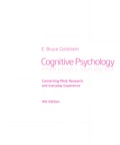
EBK COGNITIVE PSYCHOLOGY: CONNECTING MI
4th Edition
ISBN: 9781305176997
Author: Goldstein
Publisher: YUZU
expand_more
expand_more
format_list_bulleted
Question
Chapter 2.1, Problem 1TY
Summary Introduction
Introduction
Levels of analysis refer to obtaining information about a particular phenomenon from different sources, with each source adding a new dimension to the understanding of the phenomenon.
Expert Solution & Answer
Want to see the full answer?
Check out a sample textbook solution
Students have asked these similar questions
Which of the following is an example of nominal data? explain why? and what would the other examples be of datas (ordinal, etc...)a. Ratings of movie enjoymenton a 5-point scale.b. Blood type (A, B, AB, O)c. Height in centimetersd. Temperature in Celsius
• Name two early adulthood developmental tasks
• Discuss the developmental tasks of early adulthood.
• Differentiate between biological and social ageing.
Instructions:
Dance: Lebanese Dabke
Embodiment and Identity: In 150 words or more, reflect on how embodiment, which refers to the physical experience of the body, influences the expression of identities in the chosen dance form. Consider the following questions:
How does the body serve as a means of expressing cultural, gender, or personal identities in this dance form?
What specific movements, gestures, or techniques contribute to the embodiment of different identities within the dance?
Are there any historical or cultural contexts that shape the way identities are expressed through this dance form?
Chapter 2 Solutions
EBK COGNITIVE PSYCHOLOGY: CONNECTING MI
Knowledge Booster
Similar questions
- A researcher compares the effectiveness of two forms of psychotherapy for social phobia using an independent-samples t-test. Explain what it would mean for the researcher to commit a Type I error. Explain what it would mean for the researcher to commit a Type II error.arrow_forwardHelllo , according to this topic:Differential Reinforcement, DRA, Create a theise statement?arrow_forwardHhow can social media can facilitate bullying and harassment, which can have severe emotional and psychological consequences for victims.arrow_forward
- how do social media platforms often dictate trends in fashion, music, and lifestyle, significantly shaping consumer behavior.arrow_forwardCan users often present idealized versions of themselves, which can lead to unrealistic comparisons and impact self-esteem?arrow_forwardCan excessive use of social media has been linked to increased levels of anxiety, depression, and loneliness, particularly among younger users?arrow_forward
- How exposure to diverse cultures and ideas broadens one's perspective of the world, yet it can also result in cultural appropriation or homogeneity?arrow_forwardHow to develop a proposal outline with examples on How Social Media Influences Human Behavior.arrow_forwardWhile reading this article can you explain strong point , weaknesses point an future study https://doi.org/10.1126/science.1182238arrow_forward
- What are your thoughts of this article https://doi.org/10.1126/science.1182238arrow_forwardWhile readings this article what does this explain about the people https://doi.org/10.1126/science.1182238arrow_forwardMake a graph based on this data below : based on group A and Group B Group A (Bilingual): Vocabulary Task Response Times (seconds): [1.1, 1.3, 1.2, 1.0, 1.4, 1.3, 1.2, 1.1, 1.0, 1.2] Sentence Construction Task Response Times (seconds): [2.0, 2.1, 1.9, 1.8, 2.2, 2.1, 1.7, 2.0, 1.8, 1.9] Group B (Monolingual): Vocabulary Task Response Times (seconds): [1.5, 1.6, 1.5, 1.4, 1.7, 1.5, 1.8, 1.6, 1.5, 1.6] Sentence Construction Task Response Times (seconds): [2.5, 2.6, 2.5, 2.7, 2.4, 2.6, 2.7, 2.5, 2.5, 2.6] 2. Outcome of the Experiment The outcome showed that bilingual individuals performed better, with faster response times in both vocabulary retrieval and sentence construction tasks compared to monolingual individuals. 3. Descriptive Statistics Group A (Bilingual): Vocabulary Task: Mean: Mean=10(1.1+1.3+1.2+1.0+1.4+1.3+1.2+1.1+1.0+1.2)=1.21s Standard Deviation (SD): SD≈0.11s Sentence Construction Task: Mean: Mean=10(2.0+2.1+1.9+1.8+2.2+2.1+1.7+2.0+1.8+1.9)=1.99s SD:…arrow_forward
arrow_back_ios
SEE MORE QUESTIONS
arrow_forward_ios
Recommended textbooks for you
 Ciccarelli: Psychology_5 (5th Edition)PsychologyISBN:9780134477961Author:Saundra K. Ciccarelli, J. Noland WhitePublisher:PEARSON
Ciccarelli: Psychology_5 (5th Edition)PsychologyISBN:9780134477961Author:Saundra K. Ciccarelli, J. Noland WhitePublisher:PEARSON Cognitive PsychologyPsychologyISBN:9781337408271Author:Goldstein, E. Bruce.Publisher:Cengage Learning,
Cognitive PsychologyPsychologyISBN:9781337408271Author:Goldstein, E. Bruce.Publisher:Cengage Learning, Introduction to Psychology: Gateways to Mind and ...PsychologyISBN:9781337565691Author:Dennis Coon, John O. Mitterer, Tanya S. MartiniPublisher:Cengage Learning
Introduction to Psychology: Gateways to Mind and ...PsychologyISBN:9781337565691Author:Dennis Coon, John O. Mitterer, Tanya S. MartiniPublisher:Cengage Learning Psychology in Your Life (Second Edition)PsychologyISBN:9780393265156Author:Sarah Grison, Michael GazzanigaPublisher:W. W. Norton & Company
Psychology in Your Life (Second Edition)PsychologyISBN:9780393265156Author:Sarah Grison, Michael GazzanigaPublisher:W. W. Norton & Company Cognitive Psychology: Connecting Mind, Research a...PsychologyISBN:9781285763880Author:E. Bruce GoldsteinPublisher:Cengage Learning
Cognitive Psychology: Connecting Mind, Research a...PsychologyISBN:9781285763880Author:E. Bruce GoldsteinPublisher:Cengage Learning Theories of Personality (MindTap Course List)PsychologyISBN:9781305652958Author:Duane P. Schultz, Sydney Ellen SchultzPublisher:Cengage Learning
Theories of Personality (MindTap Course List)PsychologyISBN:9781305652958Author:Duane P. Schultz, Sydney Ellen SchultzPublisher:Cengage Learning

Ciccarelli: Psychology_5 (5th Edition)
Psychology
ISBN:9780134477961
Author:Saundra K. Ciccarelli, J. Noland White
Publisher:PEARSON

Cognitive Psychology
Psychology
ISBN:9781337408271
Author:Goldstein, E. Bruce.
Publisher:Cengage Learning,

Introduction to Psychology: Gateways to Mind and ...
Psychology
ISBN:9781337565691
Author:Dennis Coon, John O. Mitterer, Tanya S. Martini
Publisher:Cengage Learning

Psychology in Your Life (Second Edition)
Psychology
ISBN:9780393265156
Author:Sarah Grison, Michael Gazzaniga
Publisher:W. W. Norton & Company

Cognitive Psychology: Connecting Mind, Research a...
Psychology
ISBN:9781285763880
Author:E. Bruce Goldstein
Publisher:Cengage Learning

Theories of Personality (MindTap Course List)
Psychology
ISBN:9781305652958
Author:Duane P. Schultz, Sydney Ellen Schultz
Publisher:Cengage Learning